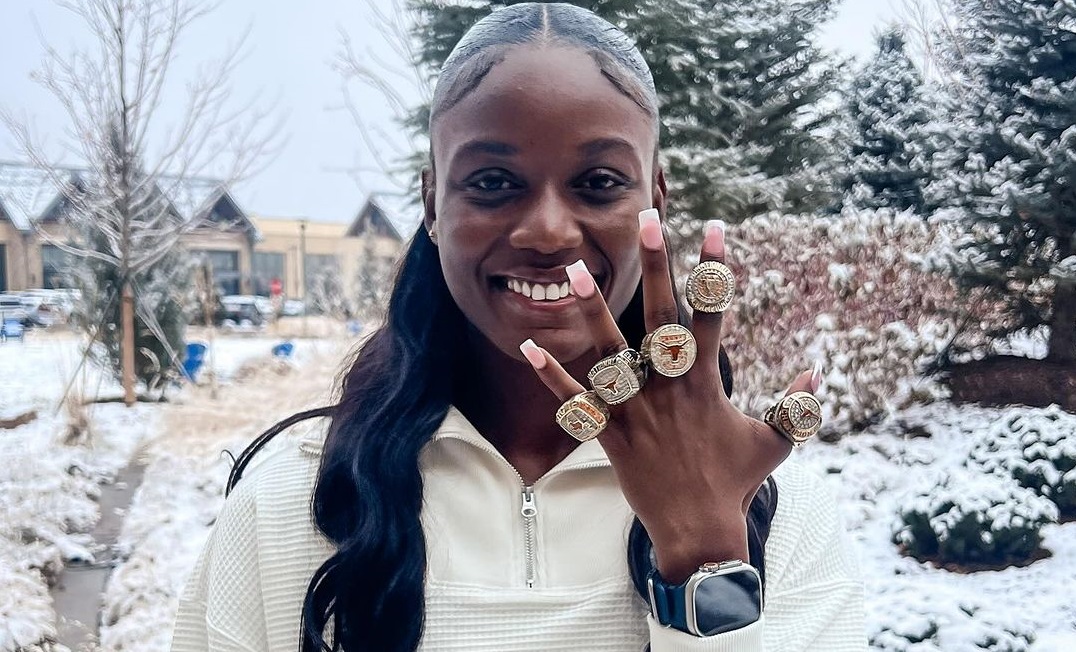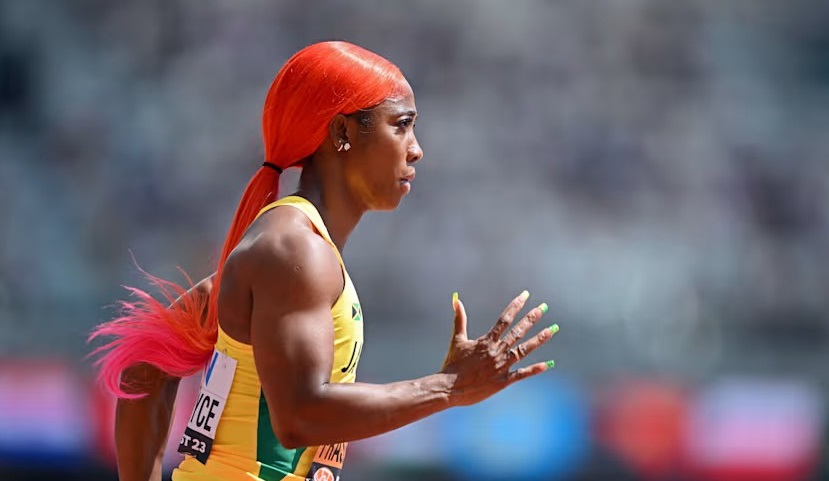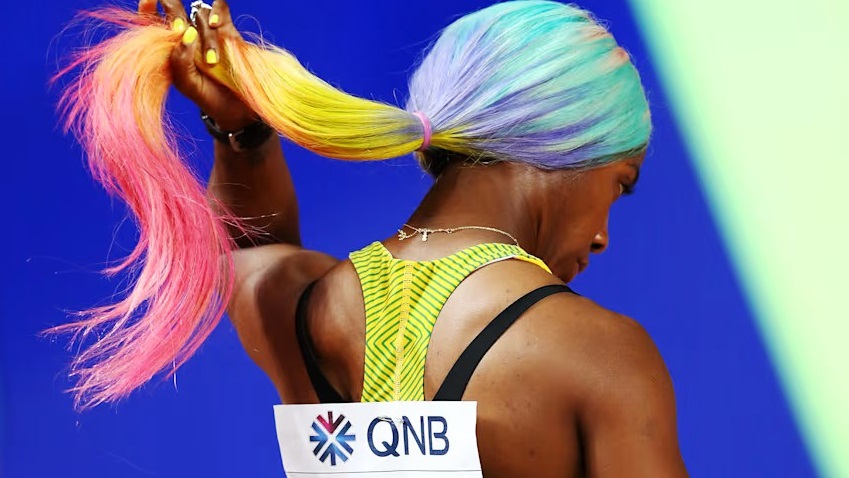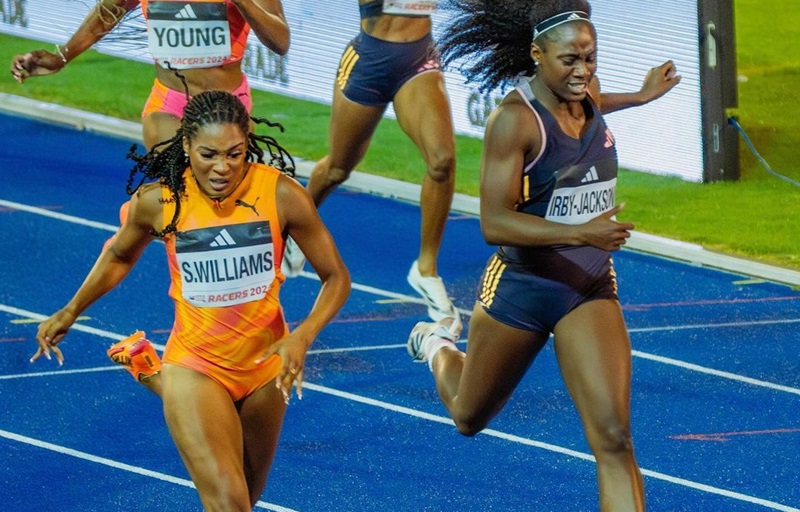At the age of 22, Alfred has already experienced her fair share of suffering, and indeed glory.
There was the loss of her father, Julian, when she was 12. There was moving away from home, to Jamaica, at just 14. There was the death last December of her old PE teacher, Simeon Stephen, who first discovered Alfred’s talent and convinced her to stay the course in athletics.
Then there is the glory.
Alfred is the reigning NCAA indoor champion over 60m and 200m, the reigning NCAA outdoor champion over 100m and 200m. She’s the 2023 Bowerman Award winner, the prize given to the outstanding collegiate track and field athlete each year. She’s the fastest woman in the world this year over 60m and 200m, which makes her a huge contender at next month’s World Athletics Indoor Championships Glasgow 24.
At this time of year, she knows all about the link between suffering and glory, given a key part of her preparation is the over-distance work that few sprinters enjoy.
“I never considered myself a 200m runner,” she says. “Only last year I got better at it because I dedicated myself to running it more with the longer workouts, which I hated before.”

They’re still not her favourite, though to strike gold in Glasgow she knows they’re essential. A few months ago, when they circled the event on her calendar, Alfred’s coach Edrick Floreal noted that the three rounds of the women’s 60m will take place on the same day.
“So being the fastest woman doesn’t play as much of a role as being the strongest woman,” he says. “Being able to run 22.2 and 22.1 (for 200m), you’re not going to die of fatigue. I need the athlete to be strong enough to replicate the same performance three times in a row.”
Saint Lucia – a Caribbean island with a population of about 180,000 people – has never won a medal at the World Indoors before, its best result being a fifth-place finish in the high jump for Levern Spencer in 2016. But Alfred looks poised to change that. She clocked a world-leading 6.99 to take victory at the Millrose Games in New York, a World Athletics IndoorTour Gold meeting, last Sunday. The run was even more impressive given her relatively sluggish start.
She didn’t have a time goal in mind that day, the objective being to “work on my start, my execution and transition.” How did that go? “I have to go back to my coach and see how I did,” she said. “I’m sure he will say it wasn’t good.”
Alfred was right.
“The start was awful,” says Floreal. “She kind of stood up, so it’s back to work on that, but I like where things are – the fact she can mess up the start and still have the strength to deal with the charge.”
In her first year as a professional, that ability to stay calm under pressure could prove a key one.
As Floreal explains: “It’s (about) handling that anxiety. That’s my job: to help her win the race from behind so she doesn’t feel like she has to have a good start. When they think, ‘I need to get a great start to get a medal,’ they put tonnes of pressure on themselves to get that and sometimes you’re stymied by that in the race. Now, I can have a s***ty start and still run 6.99 – that helps with confidence.”
Alfred has been working with Floreal since the start of 2019, when she enrolled at the University of Texas. They first met a few months before that, at the Youth Olympic Games in Buenos Aires, where Alfred won silver in the 100m. Floreal was the reason she chose Texas.
“While I was in high school in Jamaica, I watched him coach Sydney (McLaughlin-Levrone), Jasmine Camacho-Quinn, he was also coaching Keni (Harrison) at the time,” says Alfred. “Seeing him have a huge amount of great athletes, I wanted to be with a coach like that.”
Alfred grew up in Castries, the capital city of Saint Lucia, and her sprint talent was first spotted at the age of “six or seven” as she raced around the courts at school. Stephen, her PE teacher, made her race against the boys – she won – and after that she joined an athletics club, working with coach Cuthbert Modeste. Her childhood hero was Usain Bolt, and Alfred dreamed of one day doing similar things on the track. But following the death of her father, she fell away from athletics. It was Stephen who brought her back. “He saw the potential in me,” she says.
In 2015, she moved to Jamaica to attend St Catherine High School, where she came under the guidance of coach Marlon Jones. From there it was on to Texas, where she took a big leap forward, lowering her 60m PB to 7.10 in 2020 at the age of 18. The following year was lost to injury, with Alfred forced to watch the Tokyo Olympic Games from afar. But she bounced back better than ever in 2022, lowering her 100m PB to 10.81 and winning the NCAA title.

A false start in the 100m semi-final at the World Championships in Oregon proved a costly mistake, one she’s yet to repeat. Last year, her star truly went supernova, with Alfred setting collegiate records to win the NCAA indoor 60m title in 6.94 and the 200m in 22.01, both times putting her second on the world all-time lists. With another dominant sprint double at the outdoor NCAA Championships last June – she won the 100m in 10.72 (2.3m/s) and 200m in 21.73 (2.5m/s) – she closed out a magnificent collegiate career, then signed a professional deal with Puma.
Her goal at last year’s World Championships was to win a medal, but she came up just short in Budapest, finishing fifth in the 100m and fourth in the 200m.
These days, athletics has her full-time focus, with Alfred putting her spare time to use by doing driving lessons. Since the autumn, she has trained alongside Britain’s Dina Asher-Smith, the 2019 world 200m champion, along with her long-time college teammate Rhasidat Adeleke of Ireland, the reigning NCAA 400m champion.
“It’s competitive, which makes it fun,” says Alfred. “Iron sharpens iron.”
Saint Lucia has never won an Olympic medal in any sport, and Alfred knows the hype is building as the Games approach. But the only pressure she feels is from within.
“I don’t really pay attention to the media but I do have a lot of supporters back home who give messages to my family and they transfer to me,” she says. “I definitely want a medal in Paris – a gold, silver or bronze in the 100m and 200m.”
The path to an achievement like that is filled with hard work and tedious, painstaking repetition. In addition to her start, Alfred has been focusing on improving her strength and her technique. “Sometimes late in the races I use my shoulders too much,” she says.
It’s something Floreal drills into her at every workout. “The main thing is good mechanics, being able to hold that under fatigue,” he says.
Success at major championships also requires a strong mindset. What is Alfred like in that department?
“She’s fantastic,” says Floreal, who’s been highly impressed with how Alfred has handled the transition to the pro ranks. “It’s a difficult adjustment a lot of kids are not able to do; there’s a lot of people pulling at you.”
While she’s already donned her nation’s colours with pride on the global stage, the difference this year is that without an extensive NCAA schedule, she can give such championships her full focus. First up is Glasgow, then all roads lead to Paris. Saint Lucia might never have won a medal at those events, but Alfred isn’t concerned about the past, thinking only of the future.
“I’d love to be the first,” she says.





